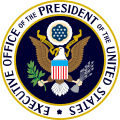This article needs additional citations for verification .(August 2021) |
| White House Political Director | |
|---|---|
 | |
since January 20, 2025 | |
| Executive Office of the President White House Office | |
| Appointer | President of the United States |
| Formation | 1978 (informally) 1981 (formally) |
| First holder | Tim Kraft (informally) Lyn Nofziger (formally) |
The White House political director, formally the director of the Office of Political Affairs (OPA) or Office of Political Strategy and Outreach (OPSO), is a political appointee of the president of the United States and a senior member of the Executive Office of the President of the United States.




















